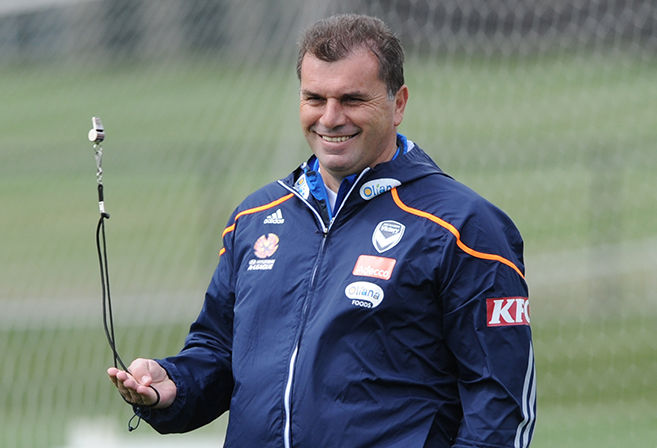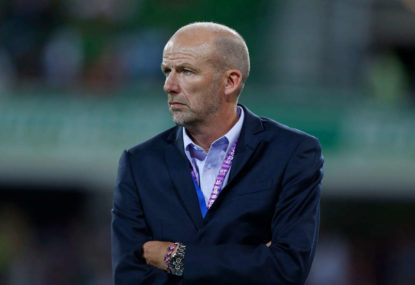Coaches have always been important, but this particular time period in the A-League feels like the era of the coach.
There has been a growing recognition of the importance of the role, more prestige and pressure attached to it, and an increasing onus on them to shape not only the fortunes, but also the tactical identity of their club.
Tactics are particularly important in a salary capped league. The nature of the salary cap means that playing squads should be, on the whole – with the exception of lavish marquees – somewhat even on the paper. Therefore, it is up to the coach to maximise returns on the playing squad. This is achieved through good tactical planning.
The very best teams in A-League history have always had a clear tactical mandate, and are excellent at targeting weaknesses in the opposition’s approach through a specific game plan. In this particular component of management, it has always been very difficult to shake off the feeling that Kenny Lowe is not the man to bring glory to Perth.
Last weekend’s 2-0 defeat to the Mariners felt like a damning blow to the Glory’s season. While Perth had, in fact, gone five matches undefeated prior to the loss in Gosford, the manner of that defeat summed up the niggling problems with Lowe’s approach.
But what exactly is Lowe’s approach? He will soon be Perth’s longest serving coach, yet it is difficult to say what his preferred style of play is.
There is nothing about Perth that makes them distinctive. They’re decent on the counter-attack, not bad with long spells of possession, are capable of defending deep, sometimes press high… but there is nothing that makes Perth, Perth. They’re average at all of those tactical concepts – and average gets you exactly where they are now: the middle of the table, in fifth position.
Think back through the great A-League teams, such as Ernie Merrick’s Victory, Vítězslav Lavička’s Sydney FC, Ange Postecoglou’s Brisbane and Graham Arnold’s current Sydney FC. Even if they wore a different kit, or you blurred the faces of the players, you could still tell straight away who these teams were from the distinctive way they play.

Of course, having a clear identity is not fundamental to success. However, Perth’s lack of a clear tactical strategy results in a lack of clarity on the pitch. In the defeat against the Mariners, for example, it was painfully clear once the Glory went behind that the players weren’t all on the same page.
Sometimes they crossed from out wide, but neither of the strikers knew the cross was coming; sometimes Liam Reddy would try to play out from the back, but the centre-backs would not be in the right position. These are the small details that come from clear, meticulous planning and preparation by the coaching staff, and rehearsed and revised on the training pitch. Perth never seem to have that level of cohesion or understanding.
It makes you wonder what the Glory work on in the four or five sessions a week prior to a match. The training sessions of most A-League clubs contain physical preparation, possession and positioning exercises, then large-scale games of eight-on-eight or 11-on-11, where the head coach has the opportunity to drill specific patterns of play and tactical concepts into his players.
Watching a Kevin Muscat, Graham Arnold or even John Aloisi session, it is clear the coach has a coherent vision of how he wants his team to play, and a comprehensible gameplan for the upcoming match to exploit an opponent’s weaknesses. The coach freezes the session, delivers key tactical messages, then ensures the players understand these instructions in the resulting passages of play. These are then reinforced with video analysis, and team meetings.
Lowe’s focus, though, seems to be about keeping his players happy. When asked about his coaching philosophy, he told Aidan Ormond on the A-League website, “For me it is the environment. It’s purely environment. I want to ensure that when players wake up in the morning they actually want to come to work.
“If I can have an environment where people are happy and enjoying themselves and enjoy the work, then we have half a chance of being successful.
“My big focus is to take care of the players.”
There is little doubt Lowe is extremely good in this regard. For all their shortcomings, the atmosphere around the Glory is always a calm, settled one. Players seem to genuinely enjoy playing under him and many have been loyal. Without a doubt, this is a critical component to coaching success.
Yet keeping the players happy also guides Lowe’s choice of formation. He often changes shape simply to fit his best players together in a starting team – even if that leaves the side unbalanced, or comes at the expense of a specific tactical approach.
For example, earlier this season he switched to a 3-5-2 against Sydney FC. This got Adam Taggart and Andy Keogh together upfront, with Diego Castro playing behind them in his favoured No.10 position. Yet Perth’s wing-backs were regularly overrun by Sydney’s overlapping full-backs, and Lowe quickly changed formation in the following games.
There is a legitimate argument to say that your best players should be in your starting team anyway, regardless of your preferred system or style. The big issue with Lowe and Perth, though, is that this seems to come at the expense of the broader tactical components of being a coach.
That may work in the short-term, such as when Keogh could not stop scoring at the start of last season, and Perth soared to the top of the table in the first ten games. In the long-term though, great teams win because of the systems their coaches put in place.
The aforementioned attention to detail in training and match preparation becomes evident in games, because the players repeat similar actions, carry out a clear gameplan and have a definitive, collective understanding of the principles that underpin why they repeat these actions and have a particular game plan.
Perth, unfortunately, never consistently have this. It happens occasionally – such as in that fine counter-attacking win over Melbourne City in October – but ultimately, if the team can’t do it consistently, that too is a reflection on the coach.
It is undoubtedly an enormously difficult job, and Lowe is clearly gifted in other aspects of management, but a coach in the A-League is now also judged on the team’s tactical approach. In this regard, Perth are languishing under Lowe.






























































































